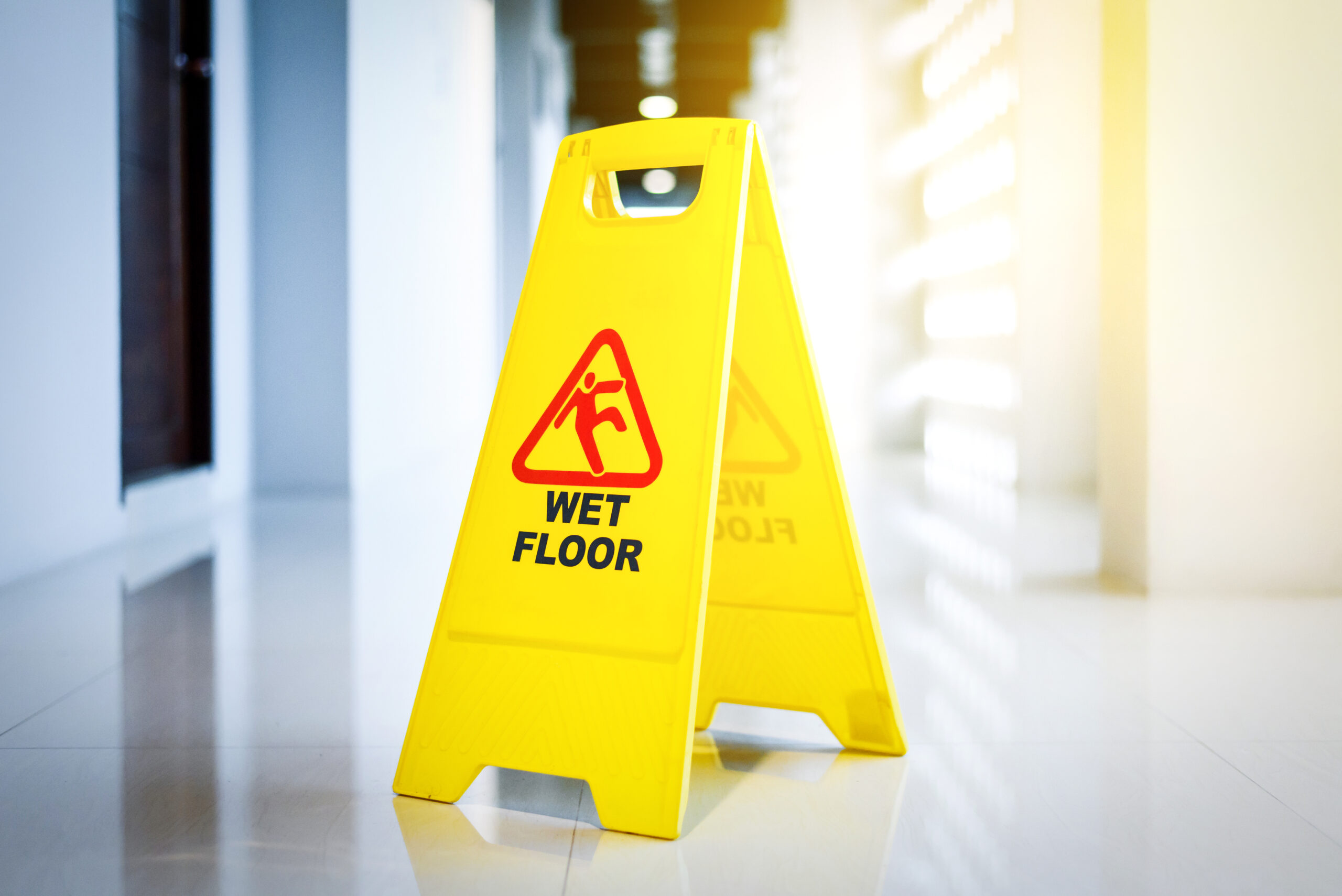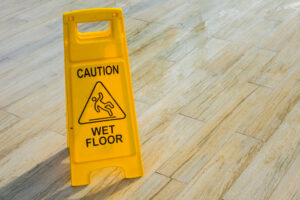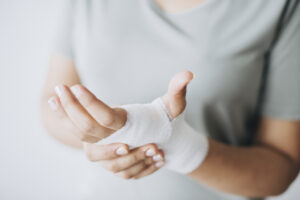
Who Is Responsible, or at Fault, for a Slip and Fall Injury?
Several parties can be liable for a slip and fall injury depending on the situation. People can certainly trip over their own feet and suffer injuries from an unintentional fall. However, falls often occur as a result of another party’s negligent failure to prevent or warn about hazardous property conditions that could cause someone to fall.
In this quick guide, we cover the common hazards that lead to slip and fall accidents, the dangers involved, those who might be liable for damages related to injuries from a slip and fall, and the types of compensation you can recover in a personal injury claim if you take legal action after suffering a slip and fall injury.
Liability in a Slip and Fall Accident
A slip and fall accident claim is a type of legal claim that is typically filed against someone who owns or manages the property where the fall occurred. The exact parties who might face legal liability for damages in a slip and fall accident depend on whether the fall occurred on a commercial property, residential property, or government property.
Proving premises liability in a slip and fall accident case typically involves showing evidence that shows negligence on the part of the property owner or manager, such as when:
- The owner created the hazard, such as a wet floor, that led to the slip and fall or trip and fall accident.
- The owner knew the hazard was present but chose not to fix it or warn visitors about its presence.
- The owner should have known the hazard existed and fixed it in order to prevent a slip and fall accident.
Even if the property owner, renter, landlord, or other potentially liable party contributed to the cause of a slip and fall through negligence, insurance companies and courts will also examine the extent to which an accident victim might also have contributed to the fall, such as if:
- The victim was trespassing on the property where the accident occurred.
- The victim was in a prohibited area on the property.
- The victim was distracted by another person or their cell phone when he or she fell.
- The victim ignored an obvious hazard that any other reasonable person would have avoided.
- The victim ignored clear signage warning of the hazard.
Types of Compensation for a Slip and Fall
Victims of slip and fall accidents may be entitled to compensation for damages related to your injuries. Each fall case is different, but the most common types of compensation awarded for slip and fall accident cases include:
Medical Expenses
If you are injured in a slip and fall accident, it is safe to say that you will obtain medical bills from the emergency room visit, physical therapy, and even surgery if required. You could also be entitled to receiving compensation from future medical bills if you experience problems later in life.
Lost wages
If you have a serious injury, you may not be able to work right away. It is common for an injured person to have to use their sick time and vacation time while they are not able to work. You have a right to receive compensation for this time used. If the fall occurred while at work, you are also entitled to workers compensation.
Pain and suffering
During the aftermath of a slip and fall accident, you may experience things such as worry, grief, insomnia, and loss of enjoyment of life. All of these things have a value that can be factored in and calculated as pain and suffering. A personal injury lawyer can help recover compensation for the emotional effects of an injury.
Comparative Negligence
Comparative negligence is a term used when it is being decided if the injured person is completely or partially at fault for the accident and their injuries. Each state has their own law regarding this.
In West Virginia, a “modified” comparative negligence is used. Meaning, if you are found to be 25% at fault for the accident, then the compensation awarded to you by the responsible party will be decreased by 25%.
Even when a fall victim contributes to the cause of a slip and fall, that injured party can often have legal rights to compensation for their injuries and losses. A slip and fall attorney can help ensure you get what is entitled to you.
Do not let the fact that your own behavior may have contributed to the cause of your fall prevent you from speaking with an experienced slip and fall accident lawyer today.
Common Causes of Slip and Fall Injuries
Many types of accident hazards can contribute to a dangerous fall that may result in severe injuries. Slip and fall warning signs include:
- Uncleared ice, snow, and debris. Property owners need to keep trash, snow, and ice cleared from their driveways, storefronts, and sidewalks to prevent a slip and fall.
- Uneven or cracked sidewalks, walkways, and parking lots. Walking paths and parking lots with large cracks, potholes, or uneven surfaces put others at risk for injury.
- Dilapidated buildings. Old buildings are full of hazards and dangerous conditions that can lead to slip and fall accidents, such as loose carpeting, wiggly and uneven floorboards, cracked tiles, or other worn floor coverings.
- Wet and dry product spills. Food, water, cleaning solution, wax, oil, sawdust, granules, and slippery floor cleaners are only some examples of wet and dry product use or spills that create a slip and fall hazard in places such as a grocery store.
- Poor lighting. Unlit areas hide hazards creating unsafe conditions and increasing the risks of someone falling.
Dangers of Slip and Falls
According to the Centers for Disease Control and Prevention (CDC), older adults face the most risk of suffering injuries from a slip and fall accident in places like nursing homes or their own home. Yet, toddlers, young children, and people of all ages can succumb to the dangers of a slip and fall. Some common injuries slip and fall accident victims suffer include:
Head Injuries
Any time someone trips or slips and falls, they risk hitting their head. The impact of a fall most commonly causes a head trauma, but can also lead to a traumatic brain injury (TBI). Concussions are the most common TBIs associated with slip and fall accidents. These injuries can cause lifelong struggles for victims, who may experience persistent headaches, cognitive problems, and motor difficulties.
Hand or Wrist Injuries
People on the verge of falling automatically put their arms out to break the fall. This makes broken or sprained wrists, arms, and hands common slip and fall accident injuries.
Hip Injuries
According to the CDC, more than 95 percent of hip fractures occur as a result of falls. Adults over the age of 65, whose bones are already more frail, are especially vulnerable to hip injuries if they experience a slip and fall or trip and fall accident leading to a serious injury.
Fractures
While hand, wrist, and hip fractures are the most common type of broken bones that occur in a slip and fall, accident victims can also fracture other bones. In a slip and fall, a person can break a leg, arm, collarbone, tailbone, ribs, or other bones. Simple fractures often require a cast or brace and cause significant pain. More complex fractures such as a spinal cord injury could require surgery and leave victims with chronic pain or discomfort.
Get the Legal Help You Need After a Slip and Fall
The Miley Legal Group serves injured clients throughout West Virginia, including those injured in slip and fall accidents.
Contact us today for a free consultation with an experienced personal injury attorney to discuss the events that led up to your slip and fall accident, your injuries, and the ways in which we may assist you.



